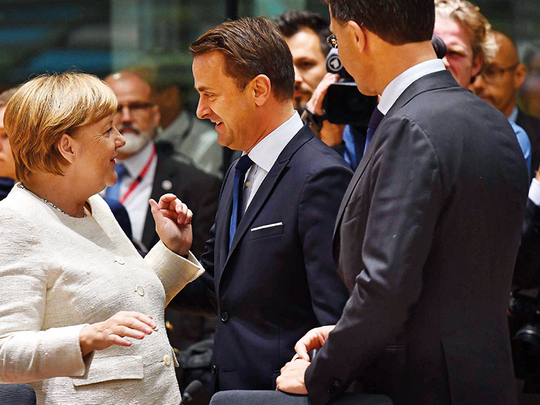
Brussels: EU leaders have warned that there must be more progress in Brexit negotiations despite hearing a personal plea by British Prime Minister Theresa May, who said she was open to a longer transition phase to unblock the talks.
European leaders had planned to hold a special summit in November to seal the divorce, but they refused to sign off on the plan, taking the bloc a step closer to the potentially catastrophic scenario of Britain crashing out in March without a deal. May had earlier addressed her fellow leaders, indicating that she could accept extending the post-Brexit transition phase to take the heat out the deadlocked issue of the Irish border, officials said.
But she failed to respond to a call by EU President Donald Tusk for “concrete proposals” of her own to move the talks forward. When the other 27 European Union leaders met without her over dinner on Wednesday evening, they concluded that “not enough progress has been made” in the negotiations, an EU official said.
The senior source said the leaders agreed talks should continue but, for now, they are “not planning to organise an extraordinary summit on Brexit in November.”
This could see a draft Brexit deal pushed back to a December summit, leaving little time for its ratification by the British and European parliaments.
Dutch Prime Minister Mark Rutte said EU leaders had asked the bloc’s executive “to work with even more vigour on a no deal scenario”.
Expectations were low before this week’s summit in Brussels, once dubbed a “moment of truth” in the Brexit talks, after a breakdown in talks between the lead negotiators at the weekend.
“I haven’t expected a breakthrough, and there wasn’t a breakthrough,” Austrian Chancellor Sebastian Kurz said after the dinner.
“But I am still optimistic that we can find a solution for the Brexit issue in the coming weeks or months.”
Earlier, May had urged her fellow leaders to work with her to find a “creative way out of this dilemma” over how to keep open Britain’s land border with Ireland, a British official said.
“I remain confident of a good outcome. The last stage will need courage, trust and leadership on both sides,” she said.
Antonio Tajani, the president of the European Parliament, said May offered them “nothing substantially new” to discuss.
EU negotiator Michel Barnier is willing to add a year to the already planned 21-month post Brexit transition period, when Britain’s relationship with the bloc stays largely the same.
But the idea is controversial among May’s eurosceptic Conservative MPs, who fear it is simply a way of delaying Britain’s exit.
As he arrived for the Brussels meeting, Barnier said “we need time, we need much more time” for talks, vowing to work “calmly and patiently” for a deal in the coming weeks.
The idea of extending the transition would be to give more time to negotiate a deal on future relations and find a formula to defuse the Irish border question.
Negotiations are stuck over the issue of a “backstop” to keep open the border between British Northern Ireland and EU member Ireland if and until a wider trade deal can be signed that avoids the need for frontier checks.
Britain has proposed staying temporarily aligned to the EU’s customs rules, but the bloc wants this to have no end date — something her eurosceptic MPs will not accept.
May said the EU was also insisting on its own “backstop”, which would see Northern Ireland alone stay aligned with the bloc’s customs union and single market.
She says this would threaten the integrity of the United Kingdom — and it is strongly opposed by her Northern Irish allies from the Democratic Unionist Party (DUP) who provide her with crucial support in parliament.












